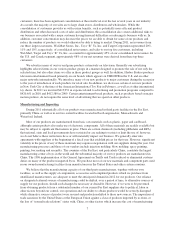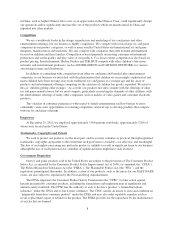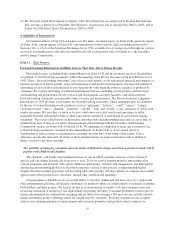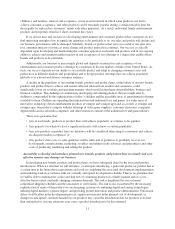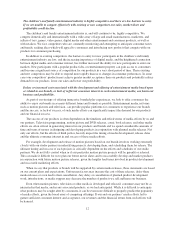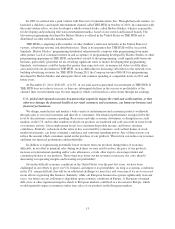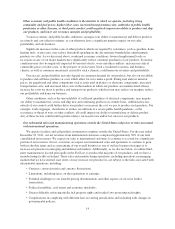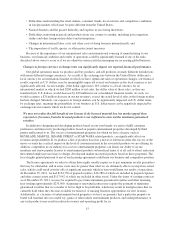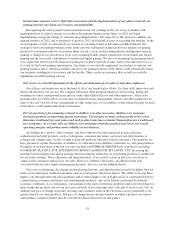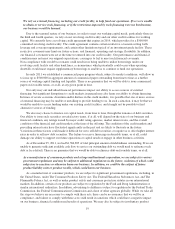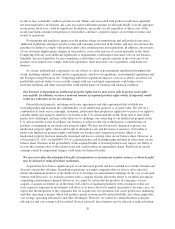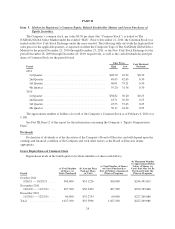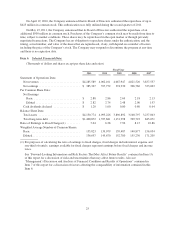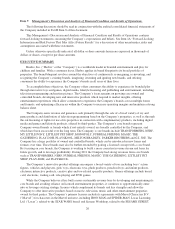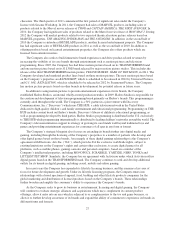Hasbro 2011 Annual Report Download - page 26
Download and view the complete annual report
Please find page 26 of the 2011 Hasbro annual report below. You can navigate through the pages in the report by either clicking on the pages listed below, or by using the keyword search tool below to find specific information within the annual report.our products or the resources they devote to promoting and selling our products, or return substantial amounts of
our products, it could significantly harm our sales, profitability and financial condition. Customers make no
binding long-term commitments to us regarding purchase volumes and make all purchases by delivering
purchase orders. Any customer could reduce its overall purchase of our products, and reduce the number and
variety of our products that it carries and the shelf space allotted for our products. In addition, increased
concentration among our customers could also negatively impact our ability to negotiate higher sales prices for
our products and could result in lower gross margins than would otherwise be obtained if there were less
consolidation among our customers. Furthermore, the bankruptcy or other lack of success of one or more of our
significant retail customers could negatively impact our revenues and result in higher bad debt expense.
Our use of third-party manufacturers to produce the majority of our toy products, as well as certain other
products, presents risks to our business.
We own and operate two game and puzzle manufacturing facilities, one in East Longmeadow,
Massachusetts and the other in Waterford, Ireland. However, most of our toy products, in addition to certain
other products, are manufactured by third-party manufacturers, most of whom are located in the People’s
Republic of China. Although our external sources of manufacturing can be shifted, over a significant period of
time, to alternative sources of supply, should such changes be necessary, if we were prevented or delayed in
obtaining products or components for a material portion of our product line due to political, civil, labor or other
factors beyond our control, including natural disasters or pandemics, our operations would be substantially
disrupted, potentially for a significant period of time, while alternative sources of supply were secured. This
delay could significantly reduce our revenues and profitability, and harm our business.
Given that the majority of our toy manufacturing is conducted by third-party manufacturers located in
China, health conditions and other factors affecting social and economic activity in China and affecting the
movement of people and products into and from China to our major markets, including North America and
Europe, as well as increases in the costs of labor and other costs of doing business in China, could have a
significant negative impact on our operations, revenues and earnings. Factors that could negatively affect our
business include a potential significant revaluation of the Chinese Yuan, which may result in an increase in the
cost of producing products in China, labor shortages and increases in labor costs in China, and difficulties in
moving products manufactured in China out of Asia and through the ports in North America and Europe, whether
due to port congestion, labor disputes, product regulations and/or inspections or other factors, and natural
disasters or health pandemics impacting China. Also, the imposition of trade sanctions or other regulations by the
United States or the European Union against products imported by us from, or the loss of “normal trade
relations” status with, China, could significantly increase our cost of products imported into the United States or
Europe and harm our business. Additionally, the suspension of the operations of a third-party manufacturer by
government inspectors in China could result in delays to us in obtaining product and may harm sales.
We require our third-party manufacturers to comply with our Global Business Ethics Principles, which are
designed to prevent products manufactured by or for us from being produced under inhumane or exploitive
conditions. Our Global Business Ethics Principles address a number of issues, including working hours and
compensation, health and safety, and abuse and discrimination. In addition, Hasbro requires that our products
supplied by third-party manufacturers be produced in compliance with all applicable laws and regulations,
including consumer and product safety laws in the markets where those products are sold. Hasbro has the right
and exercises such right, both directly and through the use of outside monitors, to monitor compliance by our
third-party manufacturers with our Global Business Ethics Principles and other manufacturing requirements. In
addition, we do quality assurance testing on our products, including products manufactured for us by third
parties. Notwithstanding these requirements and our monitoring and testing of compliance with them, there is
always a risk that one or more of our third-party manufacturers will not comply with our requirements and that
we will not immediately discover such non-compliance. Any failure of our third-party manufacturers to comply
with labor, consumer, product safety or other applicable requirements in manufacturing products for us could
result in damage to our reputation, harm sales of our products and potentially create liability for us.
17


